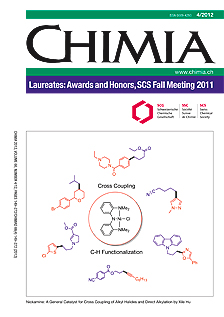Influence of Solutes on Hydration and Lubricity of Dextran Brushes
DOI:
https://doi.org/10.2533/chimia.2012.192Keywords:
Aqueous lubrication, Dextran, Friction, Hydration, Polymer brushAbstract
The characteristic lubricity and non-fouling behavior of polymer brushes is critically dependent on the solvation of the polymer chains, as well as the chain–chain interactions. Dextran brushes have shown promise as non-toxic aqueous lubricant films, and are similar in composition to natural lubricating systems, while their comparative simplicity allows for controlled preparation and fine characterization. This project entails measuring the solvation and lubricity of dextran brushes in the presence of additives which modify the inter-chain hydrogen bonding. The thickness and refractive index of the film were measured during adsorption of the brush layer onto a silica substrate and the subsequent immersion in solutions of potassium sulfate and ?, ?-trehalose. We also studied the lubricity of the system as a function of normal loading using colloidal-probe AFM. Both solutes are shown to have a minimal effect on the hydration of the brush while significantly reducing the brush lubricity, indicating that inter-chain hydrogen bonding supports the load-bearing capacity of polysaccharide brushes.Downloads
Published
2012-04-25
Issue
Section
Scientific Articles
License
Copyright (c) 2012 Swiss Chemical Society

This work is licensed under a Creative Commons Attribution-NonCommercial 4.0 International License.
How to Cite
[1]
Chimia 2012, 66, 192, DOI: 10.2533/chimia.2012.192.







